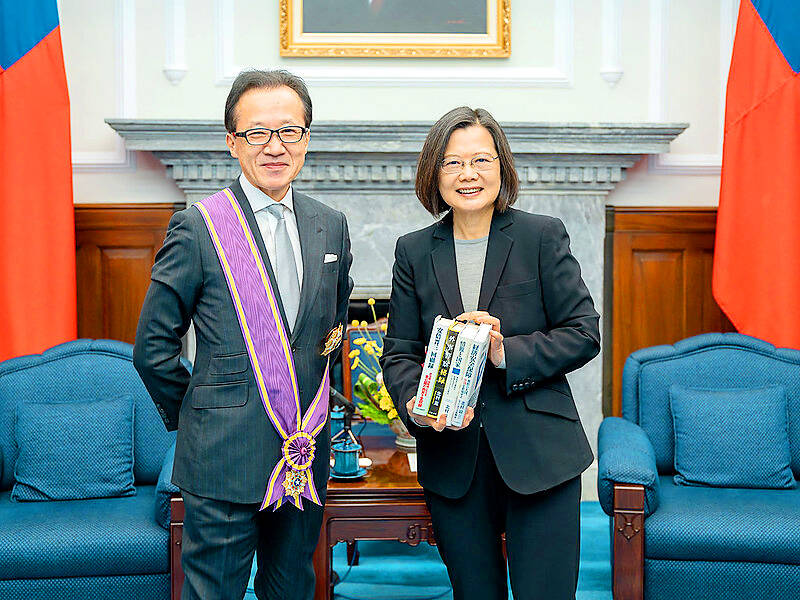President Tsai Ing-wen (蔡英文) yesterday presented former Japanese National Security Secretariat director-general Shigeru Kitamura with the Order of Brilliant Star with Grand Cordon in recognition of his contributions to deepening ties between Taiwan and Japan.
Tsai welcomed Kitamura and his family to Taiwan for the ceremony and expressed deep gratitude to him for his profound friendship with the country and long-term dedication to deepening Taiwan-Japan relations.
Kitamura, who was in 2019 appointed head of the National Security Secretariat by then-Japanese prime minister Shinzo Abe, was a key driver for the country’s new national security strategy published at the end of last year, she said.

Photo: screen grab from the Presidential Office Web site
The revised strategy states that “peace and stability across the Taiwan Strait are crucial to the peace, stability and prosperity of international society.”
Taiwan and Japan are important partners that support each other, Tsai said.
In the past few years, the two sides overcame the challenges posed by the COVID-19 pandemic, continued to deepen economic and trade relationships and bolstered industrial cooperation, she said.
Total bilateral trade between Taiwan and Japan and Japanese investment in Taiwan hit record highs last year, she added.
Taiwan Semiconductor Manufacturing Co founder Morris Chang (張忠謀) met with Japanese Prime Minister Fumio Kishida at an APEC summit last month, agreeing to foster a closer semiconductor partnership, she said.
Tsai thanked Japan for reiterating the importance of peace and stability in the Taiwan Strait, adding that Taipei would continue to work with Tokyo to safeguard regional peace and Abe’s vision of a free and open Indo-Pacific region.
Kitamura thanked Tsai for conferring the decoration and Representative to Japan Frank Hsieh (謝長廷) for helping facilitate the ceremony.
Thanks to the trust of the Taipei Economic and Cultural Representative Office in Japan, Kitamura established communication channels with Taiwan while serving in Japan’s National Police Agency and in intelligence and national security positions in the 1990s, he said.
Joining negotiations on a fisheries agreement between Taiwan and Japan, which was signed in 2013, made him realize the close connection between domestic affairs and foreign relations, he said.
Kitamura also expressed gratitude to the government and Taiwanese for their special feelings toward Abe and for offering condolences after he was assassinated last year.
The world is paying close attention to the presidential elections in Taiwan and the US next year and their effects on the international situation, he said.
As the security environment surrounding Japan and Taiwan is increasingly severe, the two should join hands to enhance deterrence over external threats by sharing diplomatic and defense intelligence and pooling together economic and technological forces, he said.
He vowed to continue pursuing the values of open and free democracy.

Taiwanese can file complaints with the Tourism Administration to report travel agencies if their activities caused termination of a person’s citizenship, Mainland Affairs Council Minister Chiu Chui-cheng (邱垂正) said yesterday, after a podcaster highlighted a case in which a person’s citizenship was canceled for receiving a single-use Chinese passport to enter Russia. The council is aware of incidents in which people who signed up through Chinese travel agencies for tours of Russia were told they could obtain Russian visas and fast-track border clearance, Chiu told reporters on the sidelines of an event in Taipei. However, the travel agencies actually applied

Japanese footwear brand Onitsuka Tiger today issued a public apology and said it has suspended an employee amid allegations that the staff member discriminated against a Vietnamese customer at its Taipei 101 store. Posting on the social media platform Threads yesterday, a user said that an employee at the store said that “those shoes are very expensive” when her friend, who is a migrant worker from Vietnam, asked for assistance. The employee then ignored her until she asked again, to which she replied: "We don't have a size 37." The post had amassed nearly 26,000 likes and 916 comments as of this

New measures aimed at making Taiwan more attractive to foreign professionals came into effect this month, the National Development Council said yesterday. Among the changes, international students at Taiwanese universities would be able to work in Taiwan without a work permit in the two years after they graduate, explainer materials provided by the council said. In addition, foreign nationals who graduated from one of the world’s top 200 universities within the past five years can also apply for a two-year open work permit. Previously, those graduates would have needed to apply for a work permit using point-based criteria or have a Taiwanese company

The Shilin District Prosecutors’ Office yesterday indicted two Taiwanese and issued a wanted notice for Pete Liu (劉作虎), founder of Shenzhen-based smartphone manufacturer OnePlus Technology Co (萬普拉斯科技), for allegedly contravening the Act Governing Relations Between the People of the Taiwan Area and the Mainland Area (臺灣地區與大陸地區人民關係條例) by poaching 70 engineers in Taiwan. Liu allegedly traveled to Taiwan at the end of 2014 and met with a Taiwanese man surnamed Lin (林) to discuss establishing a mobile software research and development (R&D) team in Taiwan, prosecutors said. Without approval from the government, Lin, following Liu’s instructions, recruited more than 70 software